#but overall he’s a devoted + kinda oblivious but well ordered in his own way kinda guy
Explore tagged Tumblr posts
Text
To me Adler signalis is just genuinely oblivious to what the rest of sierpinski staff thinks about him. He’s just that kinda guy to me, easily bored, focused on his own things and just vibin while the kolibris talk shit about him
#in my heart he has a sibling type relationship with the kolibris. they can’t stand each other but it’s different for both of them#they genuinely loathe him at times bc they think he’s annoying and boring#he just gets mad when tasks aren’t happening how they should happen but I don’t think it’s personal for him in any way#he just goes through life like hm :) ! I’m glad the protektor staff listens and respects me :) !#they don’t bro you’re their annoying ass brother (affectionate)#they listen to falke#who tells them to listen to him#adlers just funny to me I am genuinely fascinated by him and wanna study him like a bug#falke putting Adler and that one kolibri in the get along shirt#signalis#Adler#lynx rambles#I don’t have anything deep to say today u just get my silly shallow Adler musings#I also haven’t delved into his character as much as I have with Isa and Ariane for example#but overall he’s a devoted + kinda oblivious but well ordered in his own way kinda guy
33 notes
·
View notes
Text
Ranking the next 5 animes I’ve recently watched
After many distractions on my part, including playing through Steins;Gate, something that has quickly become something I adore like few others, I’ve continued my descent into the world of anime with 5 more series. The stuff I watched was a lot shorter on average than last time, and my attempts to be “objective” and my personal biases align much more closely compared to last time. With that, I’ll begin. 5. Soni-Ani: Super Sonico the Animation

Number of episodes: 12. Language options: subs only. Streaming availability: Crunchyroll. When it comes to visual novels, nitro+ is one of the biggest developers out there, alongside Key. Whereas Key is mainly out to make you really, really sad, nitro+ prefers a different approach. To my understanding, at best, their works are really, really dark, and at worst, they’re going straight for your nightmares, with stuff like Song of Saya and Sweet Pool. So clearly, the best mascot for them is the pink haired, constantly headphoned, and downright adorable Super Sonico. Even if it’s not outright official, it’s pretty jarring. Anyway, with that little rant out of the way, here’s the only thing on this list I actually wouldn’t recommend. Produced by White Fox back in 2014, this anime apparently got slammed pretty hard, and honestly, I have no idea why I even ended up watching this one. Perhaps this’ll be a reminder to be less impulsive in my choices in the future. Soni-Ani focuses on, who else, Super Sonico herself, an energetic and kind, yet clumsy college student who should reasonably be dead from stress and exhaustion. Along with college, she’s an idol, gravure model, helper at her grandmother’s restaurant and guitarist and main singer in the band First Astronomical Velocity with her friends Suzu Fujimi, the witty and manipulative bassist and official leader of the band, and Fuuri Watanuki, the mysterious drummer single mindedly obsessed with food. The series just explores some of the odd, extremely fanservice filled days of her life. It’s ok idea on paper, but in practice it’s just not really anything special or even entertaining for the most part. While I can usually ignore fanservice, it’s downright distractingly prevalent in the earlier episodes, to the point of several episode premises pretty much only catering themselves to it. Even without that, there’s just not much to be found; aside from Suzu and Sonico’s manager, the honestly hilarious Kitamura, who constantly wears a hannya mask and is willing to attack people for attempting to take advantage of Sonico, the characters aren’t anything memorable or entertaining on their own, leaving a lot of episodes feeling dry. They do improve in the second half, featuring episodes like a fairly charming murder mystery spoof, and an episode focusing on Sonico’s cats, of all things, but they’re still not something going out of your way to watch. The voice acting and animation, while at least ok, don’t stick out much either. Overall, again, this is the one thing I’d say to just avoid. There’s tons of other slice of life animes out there that are way better. If nothing else, though, I’m kinda glad I stuck to it just for the surprise cameo by Kurisu Makise’s outfit, considering I was already playing Steins;Gate.
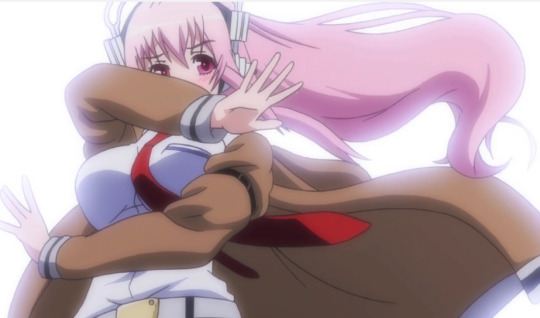
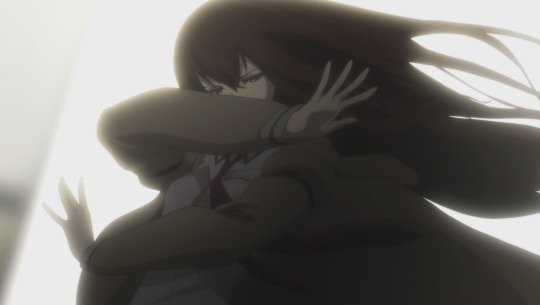
4. Monthly Girls’ Nozaki-kun
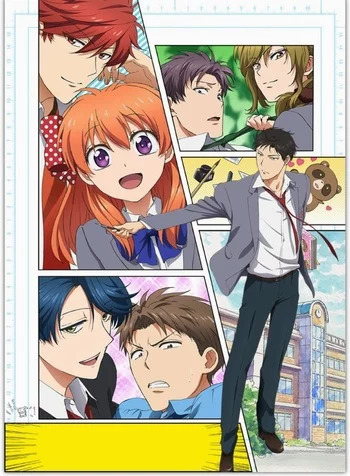
Number of episodes: 12. Language options: dub (video release only, apparently) and subs available. Streaming availability: Crunchyroll, Hulu, Netflix. Moving onto stuff I’d actually recommend, here’s a nice little anime adaptation of a gag manga by Izumi Tsubaki, produced by Dogakobo. Chiyo Sakura, a high school student who stands at an impressive 4′9″, confesses her love to the tall and mysterious Umetaro Nozaki, and gets his autograph, of all things, for her troubles. Trying again, Nozaki instead takes her to his apartment... to assist him with his manga. As it turns out, Nozaki is a popular romance manga author, whose interests in life start an end at manga, rendering him utterly oblivious to Chiyo’s feelings. Thusly, Chiyo officially becomes his assistant in order to grow closer to her crush, meeting his other associates along the way. The main thing that must be said is that this is not a serious anime in the slightest, and it’s all just big parody of romance manga more than anything, especially with the characters, like Mikoshiba, who acts like a playboy, but in reality is cripplingly shy, and Kashima, the “prince” of the school who is both actually a girl and an airhead who’s frequently on the nerves of the drama club’s president, Hori. A lot of the humor thrives on miscommunication, and it’s exaggerated enough that it works well. Every character is an idiot, in their own ways, but endearingly so, and each of them stands out, from Chiyo, who mostly plays the straight man but has her moments of over imagination, or the hilariously abrasive Seo. The plots are the right kind of dumb too, like Nozaki and Mikoshiba becoming obsessed over a helper NPC in a dating sim, or Hori gaining an intense hatred for people standing on boxes due to Nozaki’s attempts to fix perspective problems. The jokes can get a bit predictable after a while, especially with Nozaki, but overall it’s a pretty funny time. The voice acting is good, and the animation is charming. Overall, this is definitely a fun watch. If you want a good laugh, or just something that doesn’t take itself too seriously, this is definitely something to check out. 3. Angel Beats!

Number of episodes: 13 (+ some OVAs not on streaming services). Language options: dub and subs available. Streaming availability: Netflix, Crunchyroll, Funimation. As it turned out, visual novels, or at least visual novel developers, became a theme in the things I watched this time around. As mentioned before, Key is one of the biggest VN developers out there, who specialize in making you really sad. From Kanon, to Clannad, to Planetarian, to Little Busters, Key’s made a lot of great stuff, and had some great anime adaptations made, particularly for Kanon and Clannad. Thus, Jun Maeda, co-founder of Key, conceived Angel Beats to originate as an anime, produced by P.A. Works in 2010. Angel Beats focuses on Otonashi, a teenager who wakes up in a strange high school with amnesia, only able to remember his last name. He soon meets a girl named Yuri Nakamura, who informs him that they’re dead, and stuck in a sort of afterlife, seemingly ruled over by a mysterious girl they only know as Angel. In this purgatory, they’re unable to die, as Otonashi finds out first hand at Angel’s hands, and the school is populated by fabricated teachers and students, but the real people stuck there are at risk of being “obliterated” if they act like normal students, ceasing to exist. Unwilling to accept this, Yuri leads class SSS in opposition of Angel and the assumed God that created this world for the cruel fates that everyone stuck in the afterlife met, Otonashi seemingly included. With seemingly no other path to take, Otonashi joins forces with the SSS. The main strength of Angel Beats is its cast of characters. From the pretty mean yet charming Yuri, to the reliable, yet often abused Hinata, to the crazy and energetic Yui, to even some of the side characters, like Shiina, the ninja girl with a crippling weakness for wind up dog toys, or TK, who speaks in gloriously mangled English and dances constantly. The premise as well is honestly fascinating to me, and makes for some very interesting episodes. It’s got some pretty entertaining action scenes, along with some really funny moments, mostly by playing the “nobody can actually die” tidbit for all its worth, with the second episode devoting a good amount of time to slowly killing off the main group in horrible, yet blase fashions. It delivers emotionally too, with the second half in particular having a good deal of touching episodes, especially episode 10. Unfortunately, there’s one giant problem with this anime that brings it down quite a bit: it’s only 13 episodes long. While I’m not a fan of 12 or 13 episode seasons, I can’t say that’s a problem by itself. What is a problem is that they were planning to have double that amount of episodes, causing the storyline to feel very rushed, and leaving nearly every character in the cast that isn’t part of the main group very underdeveloped. While there’s an entire expanded universe of stuff, good luck tracking it all down, and while Key themselves were making a 6 part visual novel of Angel Beats to expand upon it all, something that’s very promising, only the first volume has been released so far, back in 2015, with no word since, very likely because of Jun Maeda’s health issues. Overall, Angel Beats genuinely is a good watch, but it’s kinda depressing, just because of how much potential was cut short thanks to whatever genius decided to cut the episode amount in half. Unless the VN project really gets going again, it’ll probably just remain a bunch of what could have beens. 2. Puella Magi Madoka Magica
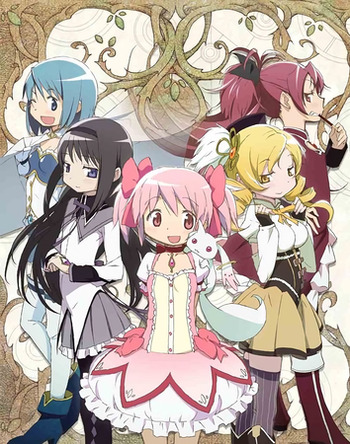
Number of episodes: 12. Language options: dub and subs available. Streaming availability: Netflix, Hulu, Crunchyroll, Funimation. Continuing the theme I unintentionally set up, here’s this famous little thing, from the mind of Gen Urobuchi, who, among other things, has worked on several nitro+ visual novels, mostly notably Song of Saya, wrote the apparently horribly depressing Fate/Zero, and was a scriptwriter for Kamen Rider Gaim, which, to my understanding, is one of the darkest Kamen Rider shows out there. Will all this in mind, there’s no real hiding that this isn’t going to be anywhere near as innocent as it tries to appear. Even if you didn’t know that, its reputation probably far exceeds it by now. Madoka Kaname is an average middle school student whose life is thrown into chaos when a mysterious girl named Homura Akemi transfers into her class, whom Madoka later finds attacking a strange creature called Kyubey. After rescuing it, Madoka and her best friend Sayaka are attacked by a strange creature known as a witch, only to be rescued by Mami Tomoe, a “magical girl” given power by Kyubey. Kyubey sees much potential in Madoka, and offers to grant her any wish of her choosing, in exchange for her becoming a magical girl as well and helping fight the witches. Homura, however, is completely determined to keep that from happening. Thus starts a chain of event in the lives of Madoka and Sayaka that, suffice it to say, don’t go very well. Without getting too specific, what starts as a mostly typical, if slightly odd, magical girl show quickly goes to very dark and twisted places, comparative to Neon Genesis Evangelion, though not quite as in depthly depressing with it. Everyone takes a beating in some way, and even with just 12 episodes, it can get a bit much for some people, even when it doesn’t end quite as awfully as you might expect. Still, it’s actually very well done. The characters are complex and flawed, but ultimately sympathetic, the overall plot is fascinating, and it ends in a very fitting way. It’s emotional, and has surprisingly good action. The dub voice work is solid, and the animation by Studio Shaft is as well, especially helped by the abstract designs of the witches themselves. While I’m not quite as passionate about it all as some are, it’s definitely earned its reputation. It’s a great watch, and definitely a big recommendation. 1. Steins;Gate
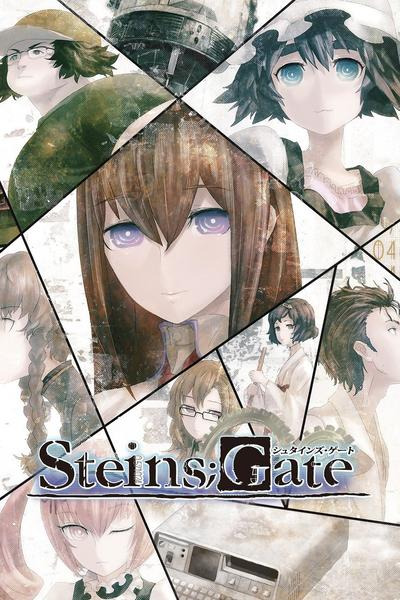
Number of episodes: 24 (+ 1 OVA). Language options: dub and subs available. Streaming availability: Funimation, Hulu, Crunchyroll. Finishing off my unintentional theme with an actual adaptation of a visual novel, there was no way I wasn’t checking this one out with how utterly passionate the VN made me. This is at least partially a bias placement, but this anime is a very, very good adaptation, and a great way to experience the story without the VN, and a great watch even having gone through it. Rintaro Okabe is a college student on break living in his “laboratory” in Akihabara. A self proclaimed mad scientist, he whittles his days away hanging out with his friends Mayuri Shiina and Itaru Hashida, inventing useless gadgets in a supposed fight against an evil organization. One day, Rintaro and Mayuri go to attend a press conference by Doctor Nakabachi in Radi-Kan, who claims to have invented a time machine, only for it to end horribly for all involved when Rintaro discovers Kurisu Makise, a young neuroscientist who had recently had her thesis published in a major science magazine, murdered by an unknown assailant. Sending an email to Itaru about the incident, Rintaro suddenly finds the world to have changed. According to everyone else, the press conference had been canceled due to a mysterious satellite that crashed into Radi-Kan, and Rintaro later runs into Kurisu, alive and well. Investigating, Rintaro finds that, by complete accident, his modified microwave has become a device capable of sending emails to the past- and that SERN, a French research organization, has been conducting time travel experiments of their own. In his attempts to understand the capabilities of what he’s invented, and his curiosity as to why his memories appear to be out of sync with everyone else’s, Rintaro rushes into a series of experiments that change his life, and those of friends old and new. This is something I could rant about all day, but putting it as succinctly as I can, I’ve never been as fascinated by time travel as Steins;Gate has made me. As fantastic as it, it’s also shown to be unpredictable, limited, and downright unsettling, especially when nobody knows just how time even works. It’s a story about the concept of time travel as much as a story about using it. The story definitely starts a bit slowly, but it’s well worth pushing past. As an adaptation, it doesn’t even need to sacrifice much, with the most that’s lost being some details in a few later arcs that aren’t worth much in the long run anyway. Beyond that, the main strength of the story is the cast of characters. Rintaro, with his rather severe case of chuunibyou, is a unique protagonist to begin with, but the events of the story turn him into an honestly fascinating and downright tragic character, and easily one of my favorite protagonists in a long time. The rest of the cast is just as good, with Kurisu being a great mix of intelligence, ravenous curiosity, and flusterability, with her and Rintaro’s interactions always being entertaining. As well, there’s the always kind, yet ditzy Mayuri, the outgoing, but odd Suzuha Amane, the endearingly gentle Luka Urushibara, and the energetic and wily Faris, just for some examples. The cast is downright loveable and very easy to get attached to. While I prefer the Japanese voice cast overall, the dub isn’t to be overlooked, with Trina Nishimura as Kurisu, Tyson Rinehart as Itaru, Cherami Leigh as Suzuha, Lindsay Seidel as Luka, and especially J. Michael Tatum as Rintaro giving great performances. Visually, White Fox did a great job giving it a distinct look. While the VN had a gorgeous and unique artstyle, it’s not really something that can be translated into animation. Instead, they used a whole lot of washed out colors and saturated lights that, combined with the sparse use of flashy effects and even music, gives a very subtle atmosphere to it all. Even beyond the style, it looks very good on its own, and it’s especially nice not having Rintaro look like a ghoul half the time, like he does in the VN.
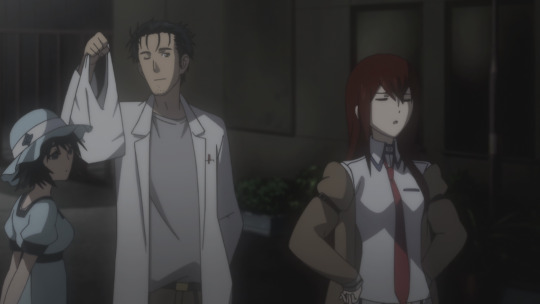
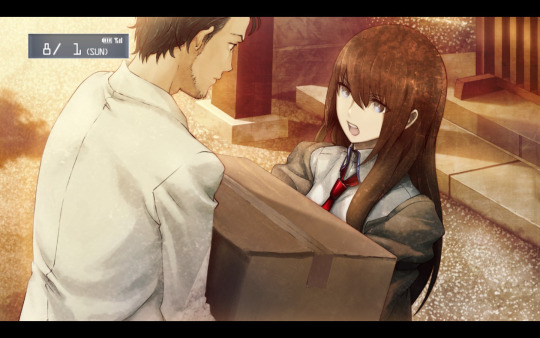
Overall, this is very much something worth checking out. I’m beating a dead horse here since Steins;Gate is already wildly popular, but it’s that way for a very good reason. There’s also an extra OVA episode, along with a sequel movie, though both are only available via Funimation. They aren’t quite the best, but they make for entertaining watches worth checking out. And with that, that’s the end to my rambling. With the exception of, again, Super Sonico, everything here is very much worth a watch. I’m sure, once I emerge from the hell of Steins;Gate spinoffs, I’ll get to watching even more stuff. Till then, though. -Scout
9 notes
·
View notes
Text
Let’s Rate Demando!
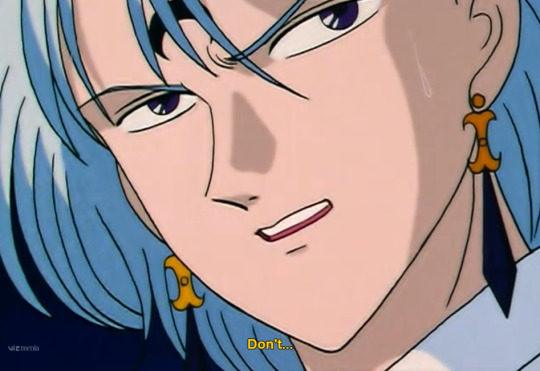
Personality: ★ ★ ★ Demando’s a weird one in that he does not express his personality as much through dialogue as behavior. He actually says very little that isn’t related to his mission or his obsession with Sailor Moon. His scenes with his allies -- even Saphir! -- are flat and impersonal, more often than not. What I get from his behavior though is that he’s arrogant and myopic, obsessed not only with himself and his mission but with a very narrow band of those interests that allows him to completely sabotage them without noticing (sitting back, smug and oblivious, while Wiseman sacrifices his allies and plots behind his back. Alienating Usagi immediately when literally all he would’ve had to do to gain her support and warmth was have an earnest conversation with her about his goals). He’s also obsessed with the idea that he must use POWER rather than persuasion to get the things he wants. It’s not executed well, but it all comes together into a reasonably coherent picture of a person. Three stars.
Style: ★ ★ I almost like Demando’s look, but it doesn’t quite work for me. He is supposed to have a Glamorous Rich Guy thing going on, so he’s got long hair, a fancy coat, spooky earrings, a throne he kicks back in swishing wine. Okay, sure. But it’s all just a liiiittle bit off. His hair looks like he’s halfway through growing it out to some target length, like it’s stuck in an unflattering in between stage. His coat jacket and his sleeves fall to exactly the same length, creating this awkward line bisecting his all-white suit that makes his arms look stubby. The wine thing gets overused to the point where it’s more of a lazy filler motif than something dramatic and character-establishing. And he needs gloves. I don’t know why, he just does. Every time I see his stupid wiggly hands in that death scene I’m like “why don’t you have gloves? This look needs gloves.” I do like the whole gang’s spooky earrings, though. Go go team spooky earrings!
Backstory: ★ ★ ★ Demando has some backstory notes in common with Saphir -- also, the flashback we do get is about Demando more than it is about Saphir. How his dream got distorted (It kinda started out a little distorted.) I definitely... have some questions, though. Like who was Demando pre-brainwashing? Was he a distinctly better person or did he just smile at his brother occasionally back then rather than musing aloud about how okay he is with sacrificing him to the cause? He still thought it was a good idea to CONQUER THE EARTH to get a flower garden, so that’s a sign that some of the problems with his mindset came pre-installed. I also really want to know how many people are living on Nemesis and like, do they have kind of an ‘evil culture’ of backstabbing and untrustworthiness or whatever. What happened to them after the story? Did they get peacefully welcomed back to present or future earth or just forgotten? We’ll never know! Maybe the Ayakashi Sisters helped sort it out offscreen.
Hero Relationships: ★ ★ ★ I poked fun at it, but I actually kind of liked Usagi almost effortlessly talking Demando out of his opposition to the people of earth. Cheap? Maybe. Poor writing? Oh, yeah. But after having to watch him sit there imperiously in his throne, blowing off Saphir’s warnings and protests and soaking up Wiseman’s halfassed excuses for an entire arc, MAN IT WAS SATISFYING to have Usagi point out the obvious and have Demando go “oh shit, you’re right! I’ve been wrong about literally everything!” It’s also really satisfying to have that happen after watching him so obsessed with Usagi’s outward appearance that he’s been trying to stifle her mind and will in order to 'own’ her -- the moment she overcomes his power to do that, she delivers a truth bomb that turns his world upside down and probably could have saved him from himself if he hadn’t put so much effort into keeping her from speaking or being a person around him. Sort of a whiff of justice to that.
Villain Relationships: ★ ★ I really did enjoy how broken up he was about Saphir, and that there were shades of his reaction that were what I’d wanted to see from Kunzite after Zoi. But beyond some dramatic facial expressions in two of his episodes, a creepy face petting in that one scene, and that wonderful little ‘truce’ moment after Saphir died, I really would not otherwise know that Demando is Saphir’s brother. I think that’s sort of the point -- that he’s grown so distant it’s ambiguous if he WOULD care if Saphir died. But also yuck, there is nothing there to watch or care about. Ditto his indifference to Esmeraude’s devotion. Having a person not react to stuff is not interesting, even if you’re doing it to make a point.
Likeable/Love to Hate: ★ ★ ★ ★ I had a lot of fun putting words into Demando’s mouth in his final episodes -- he’s a very frustrating character, and so I’m going to give him points under Love to Hate. He is so close to being an archetype I would enjoy, but then fails in just about every way possible. I liked him a lot more when I was younger and could fill in the blanks with character traits that rounded him out and made him more interesting or sympathetic.
Resolution: ★ ★ ★ I do really like that his resolution was a callback to the Issues he had prior to his final episode. Conceptually, I enjoyed what they were doing with him sort of needing to shut up, switch off his magic eye, and just listen to Usagi for a second, and that doing this CHANGED EVERYTHING for him. I liked that he explicitly sacrificed himself for Usagi, and that he actually fought against Wiseman in the end instead of getting taken in by yet more nonsense and then either blasted to oblivion or set up to fail in a fight against Usagi, In many ways, though, Demando’s death was a mess. The turnaround with Usagi is rushed and comedically easy, and the fight and death scene are awkwardly animated to the point of giving me mild secondhand embarrassment to watch them. Four stars for what the scene wanted to be, but three stars for what it actually was.
Overall: ★ ★ Uh... I don’t know, I’m really sort of bummed out about not really liking the Black Moon Clan folks at all until their death episodes. I think that means that most of what I liked back in the day came from projecting my own ideas onto the characters, or getting ideas from the dub’s artistic liberties.
7 notes
·
View notes